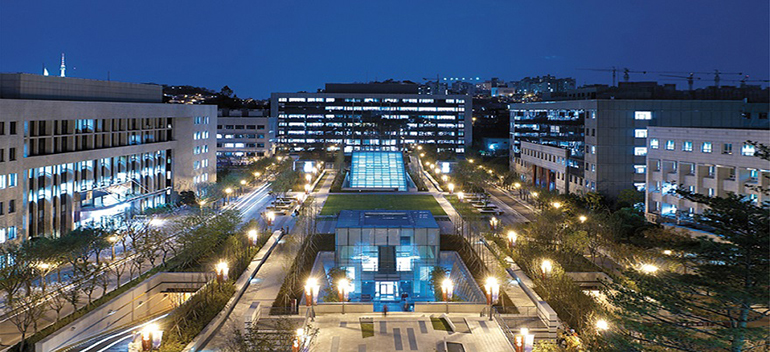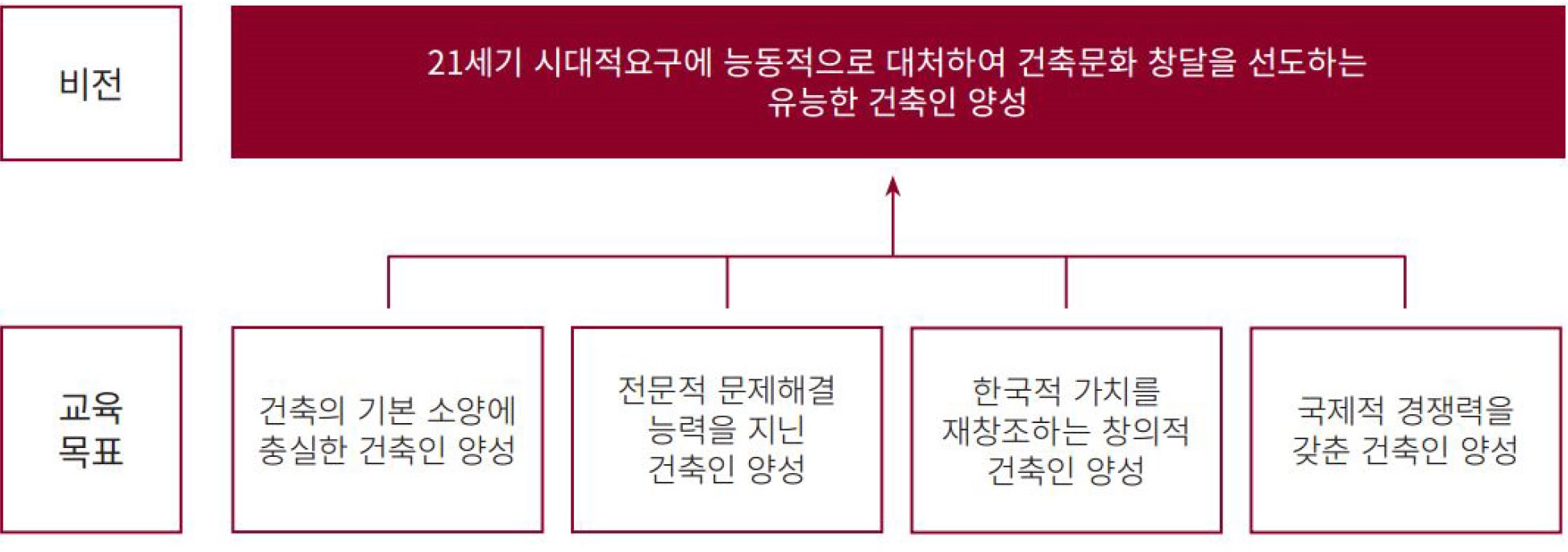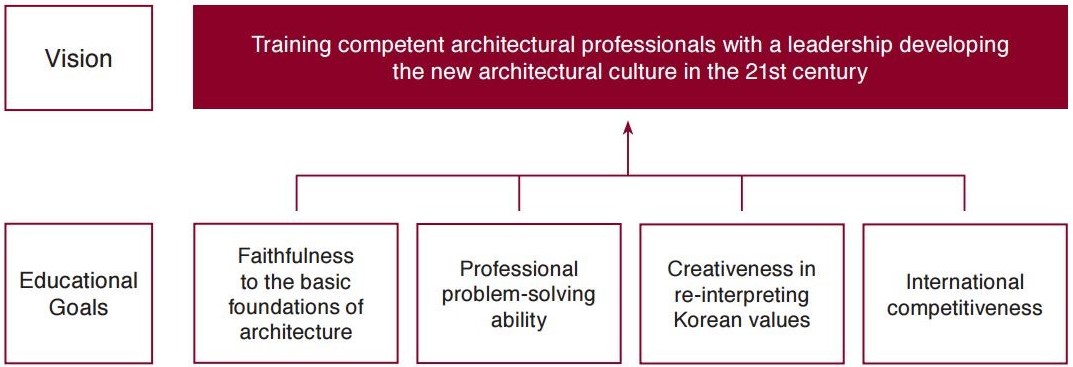Introduction
Overview

고려대학교의 “교육구국”이라는 건학이념과 “자유, 정의, 진리”라는 교육정신을 바탕으로 1963년 12월 설립된 우리 학과는 이듬해 3월 제1회 신입생을 맞이했으며, 민족문화 창달과 선진국가 건설에 이바지하는 전문 건축인 양성이라는 기본 교육목표를 토대로 정진해왔다. 그리고 50년이 넘는 역사에 걸쳐 국내외 건축계에 건축가, 엔지니어, 학자, 공무원 등 수많은 인재를 배출했다.
한편, 지난 2003년에는 보다 전문적이고 국제적인 건축인 양성의 필요에 따라 5년제 건축학사(B.Arch) 학위를 도입하게 된다. 그리고 2011년 한국건축학교육인증원(KAAB: Korean Architectural Accrediting Board)으로부터 5년제 프로그램 인증을 받았고, 2016년 재인증을 받는다. 이와 같은 변화와 발전을 토대로 우리 학과는 국제적 기준에 맞는 전문 교육과정을 운영하고 있다.
Vision and Mission (교육목표)
고려대학교 건축학과는 2003년 5년제 건축학사 프로그램을 도입하며 “21세기 시대적 요구에 능동적으로 대처하여 건축문화 창달을 선도하는 유능한 건축인 양성”이라는 통합적 비전을 설정했다. 이러한 밑그림 위에 우리 학과는 “건축의 기본 소양에 충실한 건축인”, “전문적 문제해결 능력을 지닌 건축인”, “한국적 가치를 재창조하는 창의적 건축인”, “국제적 경쟁력을 갖춘 건축인”이라는 네 가지 구체적인 건축인상(建築人像)을 실천적 교육목표로 설정하고, 그에 맞게 학생들을 교육 하고 있다.

건축의 기본 소양에 충실한 건축인
시대가 바뀌어도 건축이 근본적으로 추구하는 기능, 구조, 아름다움에 대한 요구는 변하지 않는다. 건축가는 건축주가 요구하는 기능을 충분히 담아내는 안정된 구조물을 예술적 감각으로 창작해야 한다. 이를 위해 건축가는 건축의 역사, 공간, 기능, 구조, 재료, 시공 등 건축 전반에 대해 충실한 이해를 하고 있어야 할 뿐만 아니라, 자신의 아이디어를 도면이나 모델 등을 비롯한 다양한 매체를 통해 표현하여 타인을 설득할 수 있어야 한다. 이러한 기본 소양에 충실한 건축인을 양성하는 것이 본 프로그램의 첫 번째 실천목표이다.
전문적 문제해결 능력을 지닌 건축인
건축가는 이러한 기본 소양의 바탕 위에서 현실에서 부딪치는 여러 가지 특수한 문제를 해결할 수 있는 전문인이어야 한다. 예컨대, 첨예한 법규의 제약이나 도시적 콘텍스트, 노약자를 위한 공간, 환경문제, 복잡한 구조시스템이나 설비, 다중적 문화의 코드와 관련한 문제 등에 직면해 유연히 대처하여 최적의 답을 제시할 수 있는 능력을 배양해야 한다. 본 프로그램을 통해 건축학도들은 이러한 전문적 문제해결 능력을 지닌 건축가로 양성될 것이다.
한국적 가치를 재창조하는 창의적 건축인
국제화된 가속되는 현대사회에서 더욱 조명을 받는 것은 오히려 지역에 대한 이해이고, 이를 반영한 건축의 창조이다. 세계의 다양한 문화 속에서 동아시아가 가지는 가치, 그리고 대한민국이라는 나라와 서울이라는 메트로폴리스가 갖는 지역의 가치를 끊임없이 탐구하는 것은 우리에게 주어진 과제이다. 더불어 찬란한 5000년 역사의 한민족이 가진 전통은 지금 21세기에 창조적으로 재해석할 수 있어야 한다. 우리는 학생들이 한국이라는 지역성의 가치를 인지한 창의적 건축인으로 양성할 것이다.
국제적 경쟁력을 갖춘 건축인
국가의 장벽이 무너진 현재의 세계 건축 시장에서 국제적 경쟁력 있는 건축인을 양성하는 것은 중요한 목표이다. 이를 위해 학생들은 시시각각 변하는 해외 건축 시장의 흐름을 인지해야 하고, 국제어인 영어 구사 능력을 듣기, 말하기, 읽기, 쓰기 모든 측면에 있어서 향상해야 한다. 그러나 더욱 중요한 것은 현재 국제 건축계에서 형성되는 건축 담론을 접하고, 비평하고, 우리의 것으로 체화하는 능력이다. 본 프로그램에서는 학생들에게 세계 건축의 최신 동향을 접하고 직접 국제 건축계와 소통하도록 교육할 것이다.
Overview
Since its foundation in December 1963, the Department of Architecture of Korea University, KU Architecture, has evolved loyal to Korea University founding philosophy of “Education Saves the Nation,” based on the three pillars of its educational motto: “Libertas, Justitia, Veritas” (Freedom, Justice, and Truth). From the first generation of students who registered in March 1964 to the present, our department has devoted itself to educating and nurturing professional architects able to significantly contribute to the advancement of Korean culture and the construction of a modern country. In its history of over 50 years, KU Architecture has produced a large number of outstanding alumni, who are making remarkable contributions as architects, engineers, scholars, and civil servants, both at home and around the world.
Vision and Mission
In 2003, KU Architecture introduced a five-year B. Arch degree to align its curriculum with the international architectural educational standards for professional degrees. This professional program was certified by the Korean Architecture Accreditation Board (KAAB) in 2011 and re-certified again in 2016. Its vision aims at the training of competent professionals able to face the challenges of the 21st century, taking the role of leadership in developing the new architectural culture. Ultimately, our education is concentrated on fostering architecture professionals under four guiding educational principles: faithfulness to the basic foundations of architecture, professional problem-solving ability, creativeness in re-interpreting Korean values, and international competitiveness.

Faithfulness to the basic foundations of architecture
Although times changes, the requirements for function, structure, and beauty that architecture fundamentally pursues do not change. Architects should create stable structures that fully satisfies the functions demanded by the client with an artistic sense. For this, architects should not only have a full understanding of the overall architecture including as history, space, function, structure, materials, and construction, but also have the ability to persuade others by expressing their ideas through various media such as drawings and models. To train architects who are faithful to these basic grounding is the first practical goal of this program.
Professional problem-solving ability
Architects are experts who can solve various unique problems encountered in reality based on such basic grounding. For example, they should train the ability to respond flexibly in the face of problems related to strict legal restrictions, urban contexts, space for the elderly, environmental problems, complex structural systems or facilities, and multicultural codes to provide optimal answers. Through this program, students of architecture will be nurtured as architects equipped with the professional problem-solving ability.
Creativeness in re-interpreting Korean values
In the globalized and accelerating modern society, the understanding of local region and the creation of architecture that reflects it is more highlighted. In the various cultures of the world, our mission is to constantly explore the value of East Asia, and the value of Korea and Seoul metropolis. In addition, the tradition of the Korean nation with the splendid 5,000-year history should be creatively reinterpreted in the 21st century. We will train our students to become creative architects who recognize the locality value of Korea.
International competitiveness
It is important to nurture internationally competitive architects in the current global architectural market where national barriers have been broken down. To this end, students should be aware of the constantly changing trends in the overseas architectural market and improve their English skills which is an international language, in all aspects of listening, speaking, reading and writing. However, more important thing is the ability to access, criticize, and embody the current discourse in the international architecture world. In this program, students will learn the latest trends in world architecture and directly communicate with the international architecture community.